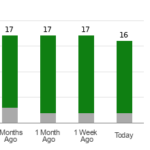Amidst heightened geopolitical tensions between the United States and China, a recent report in The Information has exposed how Chinese entities are cleverly acquiring Nvidia’s high-end AI chips through unconventional means. ByteDance, the owner of TikTok, is reportedly circumventing U.S. sanctions by leasing Nvidia’s AI chips from Oracle.
This duplicitous behavior is not limited to ByteDance alone. China Telecom, a state-owned wireless carrier, is also toying with the idea of striking similar deals with other cloud service providers. Despite the U.S. imposing embargoes on exporting AI chips to China, Chinese companies can lawfully purchase or rent these chips for use within the United States.
Furthermore, tech giants like Alibaba and Tencent have also been in talks with Nvidia to procure AI chips for their U.S.-based data centers, further highlighting the intricate web being spun around these coveted technological assets.
Evolution of U.S. Restrictions on AI Chip Exports to China
The ongoing friction between the U.S. and China has culminated in stringent restrictions being placed on the export of AI chips to the Chinese market. Last year, rumors swirled regarding an impending executive order from the Biden administration mandating cloud computing behemoths such as Amazon to divulge customer information to U.S. authorities.
Innovative Tactics to Skirt Around Sanctions
In response to the escalating controls on AI chip exports to China, Chinese firms are resorting to innovative tactics to sidestep these regulatory hurdles. Reuters recently revealed that Chinese entities, including educational institutions and research facilities, have found ways to procure high-end Nvidia AI chips through intermediary resellers.
Meanwhile, Nvidia is vying to capture the Chinese market by offering lower-end GPUs like the H20. However, a formidable opponent arises in the form of Huawei’s AI chip, intensifying the competitive landscape for Nvidia. Additionally, reports indicate that the Chinese government is actively encouraging companies to prioritize domestically produced AI chips over imports from the U.S.
Analysts’ Outlook on Nvidia: To Buy or Sell?
Despite the intricate dance of sanctions and maneuvers, analysts continue to exude confidence in NVDA stock, backing it with a Strong Buy consensus rating supported by 27 Buy recommendations against three Holds. So far this year, NVDA has soared by over 100%, with the average price target of $1,208.89 foreseeing a marginal 0.09% downside potential from its current value.






